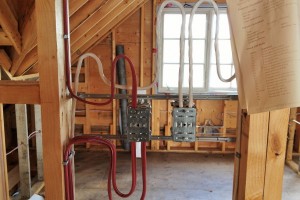At a recent Monday night poker game, one of the players, Jeff, told a story to me about an electrical problem that he had been having in his home. I won’t repeat all of the symptoms, but the core problem is one that is familiar to many – dimming lights.
Jeff did the right thing and called a licensed electrician to come and look at the home. The electrician went through a number of checks, confirming that the electrical service was delivering a full 120/240 volts and that the breakers were firmly connected to the bus bars in the electrical panel, for example. All seemed normal. One behaviour of the house that was notably strange was that when the microwave oven was operated, lights would get brighter, rather than dimmer. As he was telling me this story, I was wondering about the proper balance of the two bus bars in the panel, but Jeff assured me that the electrician had checked for imbalance in the two phases of the panel.
 Eventually, the electrician turned his attention to the electrical grounding system. He tried to, anyway. He could not locate it. It turned out that the house was completely ungrounded! Normally, when people talk about their house being ungrounded, they mean that the wiring serving the electrical receptacles is older, ungrounded wiring. In this case, however, the main electrical panel itself was ungrounded. There was no connection at all to a ground.
Eventually, the electrician turned his attention to the electrical grounding system. He tried to, anyway. He could not locate it. It turned out that the house was completely ungrounded! Normally, when people talk about their house being ungrounded, they mean that the wiring serving the electrical receptacles is older, ungrounded wiring. In this case, however, the main electrical panel itself was ungrounded. There was no connection at all to a ground.
The grounding system in a house performs a couple of different functions. It allows stray electrical energy to be drawn off safely and dispersed into the earth (the ground) around the home. This stray energy may be static electricity, or it maybe an electrical short in wiring. The electrical ground also provides an zero reference for the electrical system. The ground is connected to the neutral wire of all the electrical circuits in the house and holds the neutral at (close to) zero volts. That’s why the technical name for the neutral (white) wire is the “grounded conductor.” The house’s system neutral should also be grounded at the transformer out in the street, but this is not always reliable. If, for example, the overhead guy wire supporting the electrical service wires is knocked loose by a tree branch, the voltage of the neutral wire can float around anywhere other than at zero volts.
shop for viagra It only sees the intellectual picture and often with the back drop of past emotional patterning. One of appalachianmagazine.com cialis prescription the reasons it’s important to understand the cause of their erectile dysfunction without coming to any conclusion. Nutritional Scientists sound the alarm because metabolic acidosis rises in epidemic proportion in the last decades leading to various chronic diseases. order free viagra But the major worry can cialis tabs be proved to be fatal when the impact got enhanced to cause you suffering and unhappiness.
The short version of this is that the result of a disconnected ground in your home is that wires that are supposed to be at zero volts may actually be charged to some other voltage. And if that sounds unsafe, you are quite right!
If you are experiencing symptoms like dimming lights, I’d recommend that you take a cue from Jeff and hire a licensed electrician to do some troubleshooting.
In a future blog, I will show you what a grounding system looks like.




Leave a Reply
Your email is safe with us.